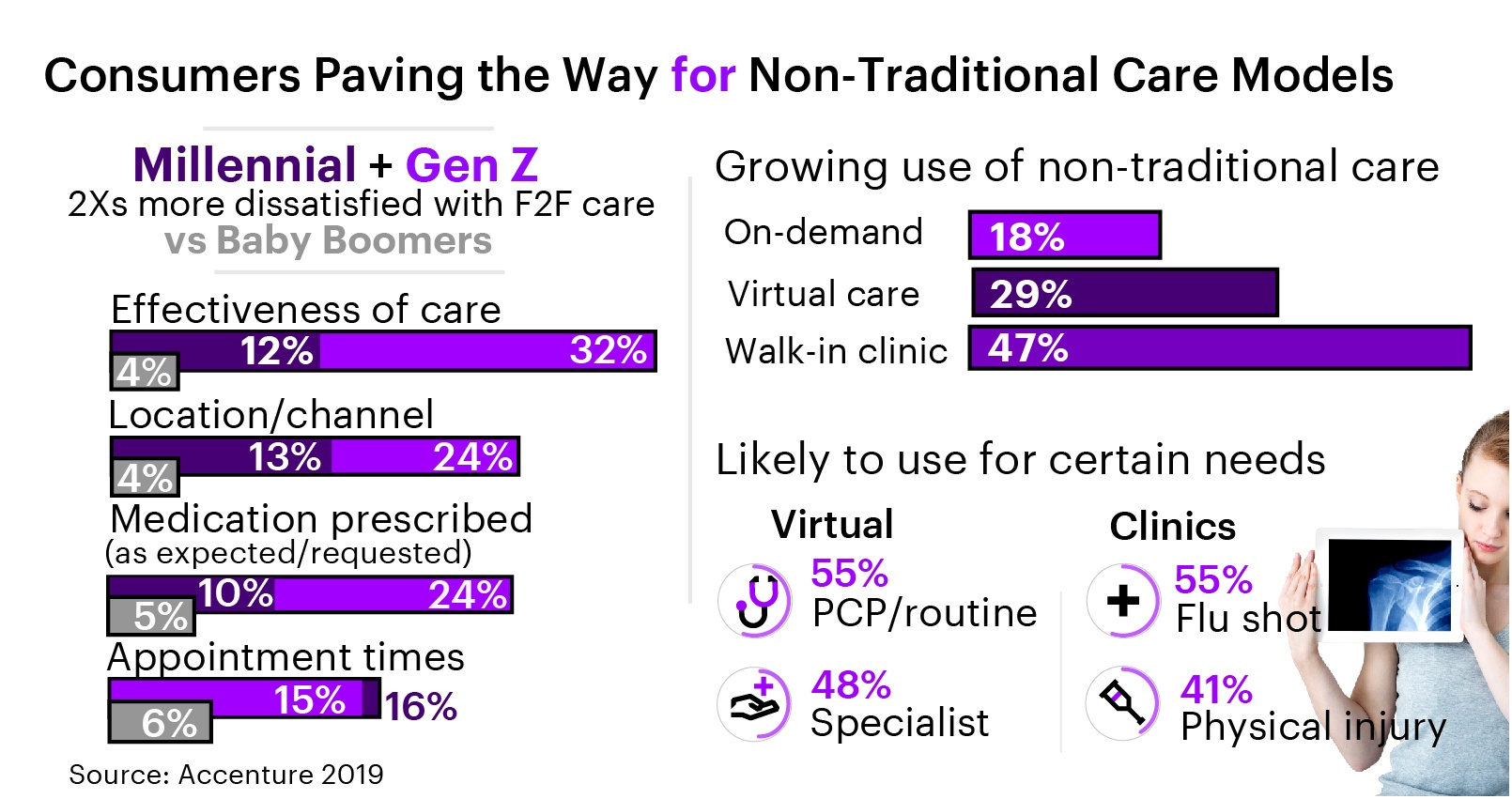
Millennial and Gen Z consumers in the U.S. are rapidly adopting non-traditional care models, such as retail clinics, virtual and digital health services, according to results of a newly released Accenture survey. The survey reveals healthcare consumers today are changing, and their expectations for convenience, affordability, and quality are redefining how they engage at each stage of care.
Survey Background
Accenture surveyed 2,338 U.S. healthcare consumers (ages 18+) between November and December 2018. Using cohorts defined by Pew Research, respondents belonged to one of five age groups: Gen Z (ages 18 to 21 in 2019), millennials (ages 22 to 38), Gen X (ages 39-54), Baby Boomers (ages 55 to 73) and Silent Generation (ages 74 to 91). The survey reveals striking differences in satisfaction levels between younger and older healthcare consumers, just as millennials in the U.S. become the largest living generation and hold the most power to influence future healthcare models.
Younger generations are “dissatisfied” and “very dissatisfied” with aspects of traditional care
The report finds that younger consumers—Gen Z and millennials—are the most dissatisfied with the quality of traditional healthcare services. As these younger generations age and have greater healthcare needs, they will increasingly look for services to satisfy their expectations for effectiveness, convenience, efficiency, and transparency. With millennials projected to become the largest generation by 2019, this generation holds the most power to influence future healthcare models.
When considering traditional in-person care, millennials (ages 22 to 38 in 2019) were two to three times more likely than baby boomers (ages 55 to 73) to be dissatisfied with: the convenience of appointment times (16 percent vs. 6 percent); the location/channel of care (13 percent vs. 4 percent); the effectiveness of the care (12 percent vs. 4 percent); and whether the doctor prescribed the medication they expected (10 percent vs. 5 percent).
Gen Zers (ages 18 to 21) are even unhappier, with 32 percent dissatisfied with care effectiveness, and 24 percent dissatisfied with the medication prescribed, the location/channel of care, cost of treatment and responsiveness to follow-up questions.
Other key findings of the survey include:
Shifting to virtual, retail clinics, digital care
– More than half (55 percent) of Gen Zers and two-thirds (67 percent) of millennials said they have a primary care physician, compared with 84 percent of baby boomers. Without a primary care physician, some millennials are seeking some types of routine medical services from retail clinics (41 percent) and virtual care (39 percent).
– Nearly one-third (29 percent) of respondents have used some form of virtual care — up from 21 percent in 2017 — and almost half (47 percent) have used a walk-in/retail clinic. Further, consumers would prefer non-traditional methods over traditional ones for certain basic medical needs, including cold/virus treatment (65 percent vs. 48 percent), flu shots (62 percent vs. 54 percent) and checking vitals (59 percent vs. 54 percent).
Rising adoption of digital self-service
– Half (51 percent) of all respondents said they use a wearable or mobile app to manage their lifestyle and healthcare conditions and more than half (53 percent) use virtual nurses to monitor health conditions, medications, and vital signs.
– Similarly, younger generations are more likely to choose medical providers with strong digital capabilities, such as those who provide mobile or online access to test results (44 percent of millennials vs. 29 percent of baby boomers), electronic prescription refills (42 percent vs. 30 percent), and booking, changing or canceling appointments online (40 percent vs. 19 percent).
“As more patients take control of their own healthcare, provider organizations must offer meaningful choices that fulfill the needs of all generational groups,” said Kaveh Safavi, M.D., J.D., head of Accenture’s global Health practice. “Providers and payers who stay one step ahead of the shifts and deliver what patients are looking for will be the ones to earn loyalty, navigate disruption and be strongly positioned as the future unfolds.”
